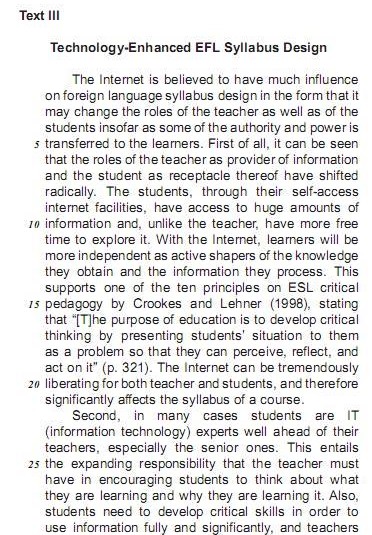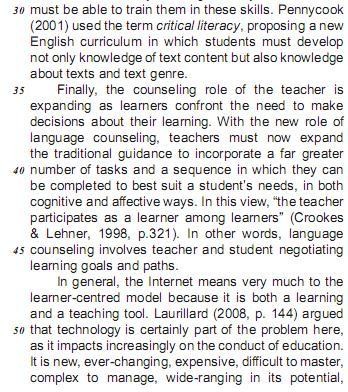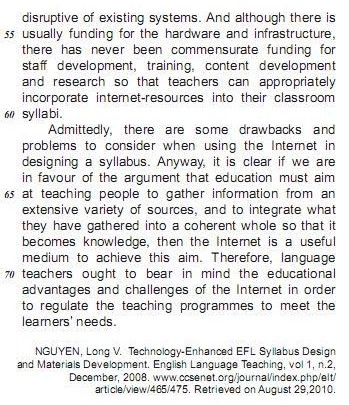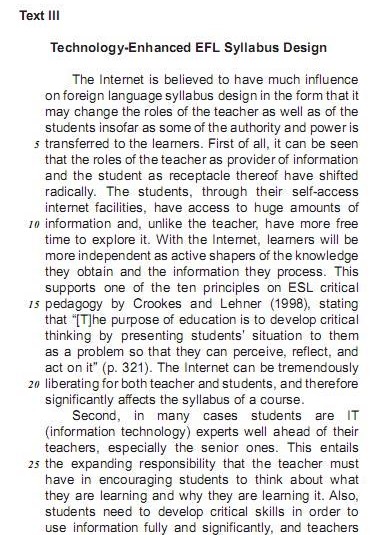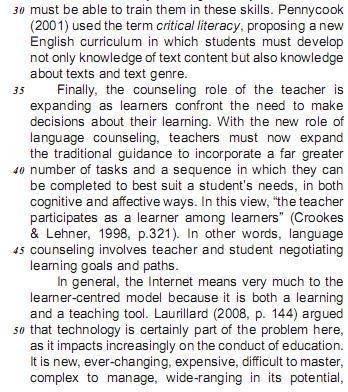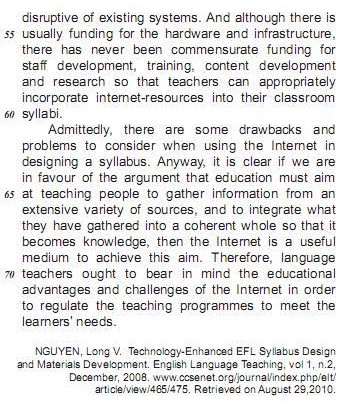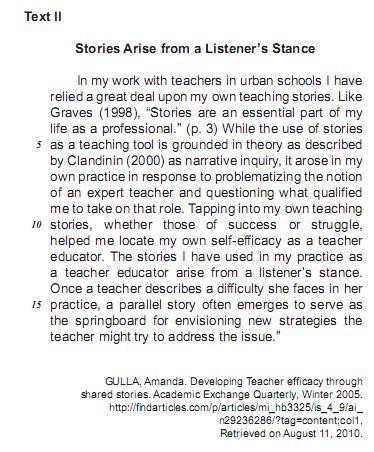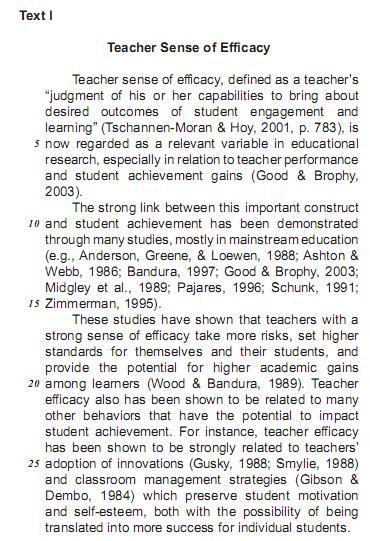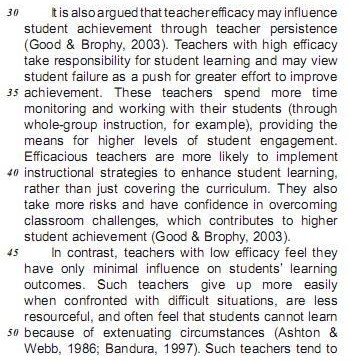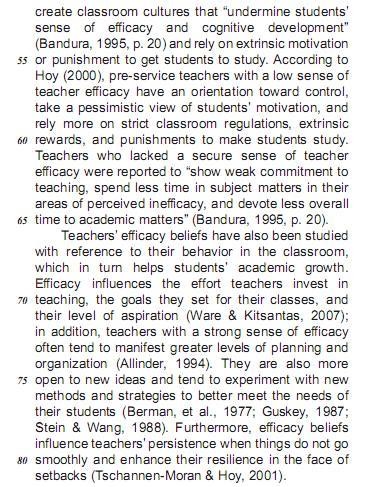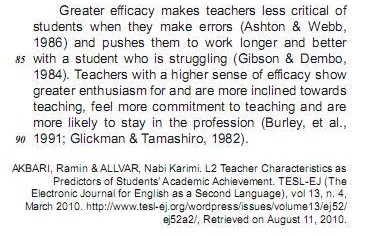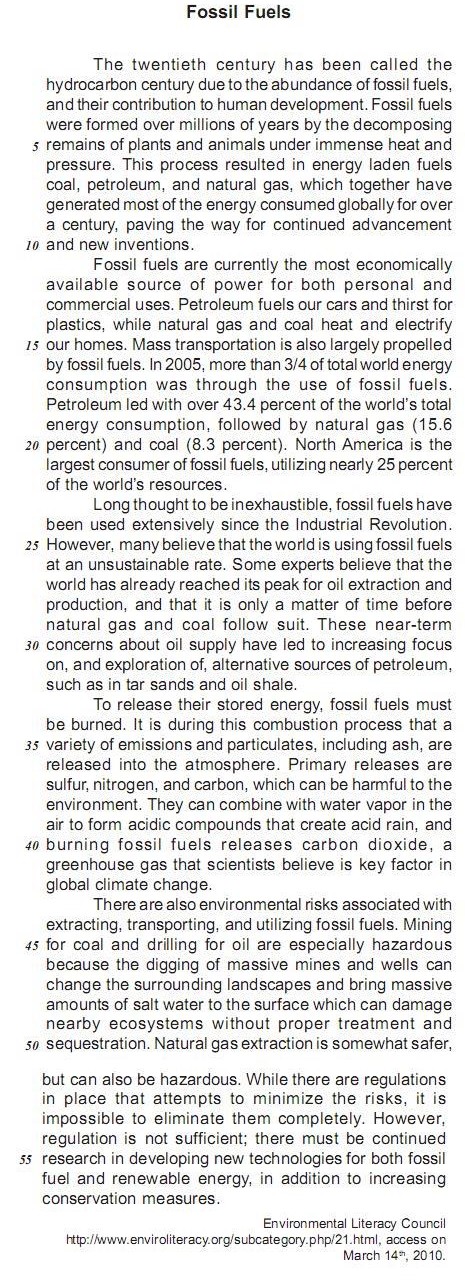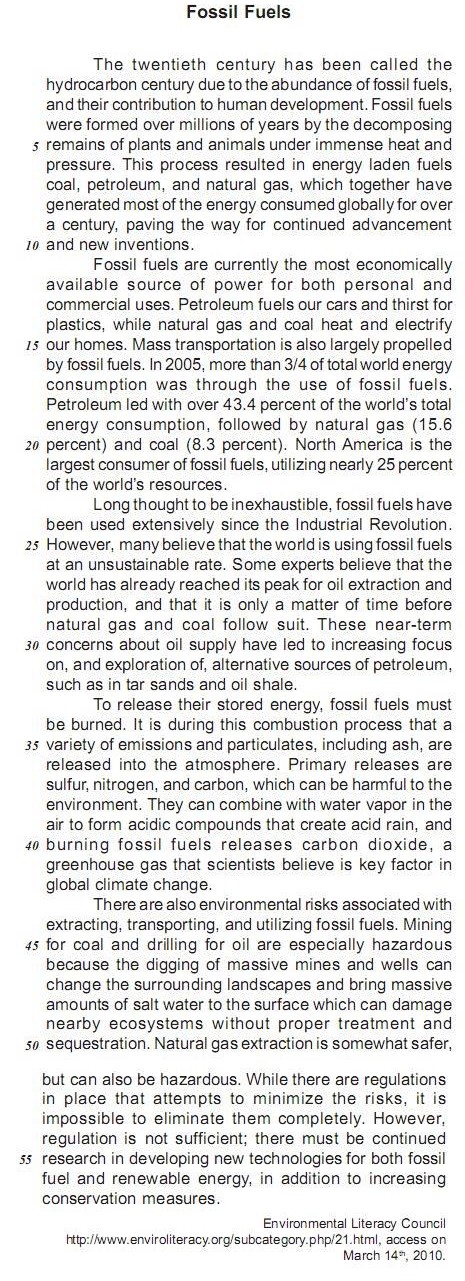In this view, (line 42) refers to an educational perspective in which the
In Text III, each paragraph can be identified with a specific purpose. The appropriate description of the paragraphs intent is found in
The linking words in boldtype and the item in parentheses are semantically equivalent in
O texto a seguir é referência para as questões de 21 a 23.
We are accustomed to thinking of military success as determined by quality of weaponry, rather than by food supply. But a clear example of how improvements
in food supply may decisively increase military success comes from the history of Maori New Zealand. The Maori are the Polynesian people who were the first
to settle New Zealand. Traditionally, they fought frequent fierce wars against each other, but only against closely neighboring tribes. Those wars were
limited by the modest productivity of their agriculture, whose staple crop was sweet potatoes. It was not possible to grow enough sweet potatoes to feed an
army in the field for a long time or on distant marches. When Europeans arrived in New Zealand, they brought potatoes, which beginning around 1815
considerably increased Maori crop yields. Maori could now grow enough food to supply armies in the field for many weeks. The result was a 15year period in
Maori history, from 1818 until 1833, when Maori tribes that had acquired potatoes and guns from the English sent armies out on raids to attack tribes
hundreds of miles away that had not yet acquired potatoes and guns. Thus, the potato’s productivity relieved previous limitations on Maori warfare, similar
to the limitations that lowproductivity corn agriculture imposed on Maya warfare.
(Diamond, J. (2006). Collapse. London: Penguin.)
Which of the following sentences is NOT true, according to the text?
O texto a seguir é referência para as questões 24 e 25.
William Penn (16441718), founder of Pennsylvania. Son of an admiral, he was sent to a Puritan school and was expelled from Oxford as a dissenter in 1660.
Sent to Ireland to manage the family estates, he regularly attended the Quaker meeting at Cork, and on his return to England he was twice imprisoned for
proselytizing, but nonetheless retained connections with the court. In 1681, Charles II repaid a debt owed to Penn’s father by granting him a large province
on the west bank of the Delaware river in North America. Penn drew up a frame of government providing for religious toleration in the new colony, which he
named Pennsylvania. After he had supervised the building of Philadelphia (16824), he returned to England and, on James II’s accession, secured the release
of some 1,200 Quaker prisoners. Out of favour after the Glorious Revolution, he returned to America in 1699, but financial mismanagement forced him to
mortgage his rights as proprietor of the colony.
(Gardiner, J., & Wenborn, N. (eds.) (1995). The History Today Companion to British History. London: Collins & Brown.)
Penn was imprisoned in England:
In To release their stored energy, fossil fuels must be burned. (lines 33-34) the expression in boldtype can be replaced by:
My name’s Lauren. I don’t work full-time. I’ve got a
part-time job in a fast food restaurant. I work on one or
two evenings a week and on Saturdays. I work about
fifteen hours a week. The pay isn’t very good, I get
about $3.80 an hour but it’s hard work. I work because
I need the money. I like going out and I buy CDs and
clothes. They’re expensive and I get $10.00 a week
pocket money. But I’m leaving my job in may because
I’ve got exams and I need to work for them. I can get a
different job in the summer.
After read about Lauren, answer the questions.
1) Where does Lauren work?
2) How many hours a week does she work?
3) What does Lauren buy with her money?
4) Why is Lauren leaving her job?
5) When is Lauren going to get a new job?
In the right sequence, the answers are:
PART 1: READING COMPREHENSION
Based on the text below, answer questions 21, 22 and 23.
Inside The U.S. Navy's Leadership School
The top level of Navy leadership is its admirals . There are 238
of them. They have responsibility for more than 390, 000 members of
the Navy and control an annual budget of more than $130 billion.
They are the equivalent of a corporate C–suite. Of the more than
3,000 captains who serve in the Navy, roughly 38––barely 1% ––make
the cut to admiral each year.
In 2001 the chief of naval operations––the Navy's CEO––asked
retired Vice Admiral Phil Quast, who had spent 38 years in the Navy,
to establish the program that became the Executive Learning Office.
"Of 238 admiral positions, fewer than 40 are concerned with actual
war fighting, " Quast notes. "The vast majority is doing jobs
analogous to that of a CEO, CTO, CFO, COO or other functional
business areas. Our job is to help them develop the business acumen
they need to run the business of the Navy as excellent stewards of
the public's money and its trust."
(Adapted fromhttp:/ /www.forbes.com)
The word "steward" in " (...) to run the business of the Navy as excellent stewards of the public's money and its trust." means:
PART 2: USE OF ENGLISH
What would you say if you didn't have a pen and wanted to use your friend's?
Which alternative completes the sentence correctly?
Listen! He is broke! If he (1) the money, he (2) you.
Which sequence best completes the conversation below?
Jane: Did you paint your bedroom when you (1) to your new
flat?
Mary: Yes, I did.
Jane: But did you do it yourself or did you call a painter?
Mary: Oh, I don't think I'd able to do it myself. I (2) my
bedroom (3) .
What is the correct way to complete the sentence below?
According to this article, everybody in costal cities
(1)find a way to escape from the 2012 tsunamis.
Which alternative completes the sentence correctly?
Unlike the atmosphere, which (1) by turbulent weather systems,
the deep waters are fairly stable. This is because it (2) from
above, in contrast to the atmosphere, which (3)from below.
(Adapted from http: //www.global–greenhouse–warming.com/ oceans.html)

